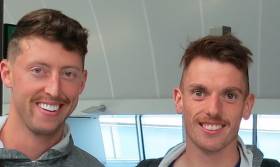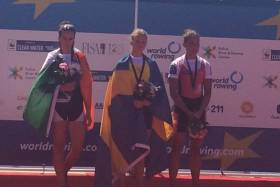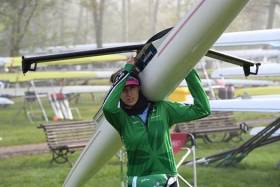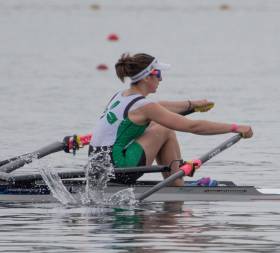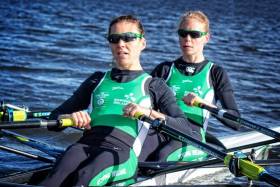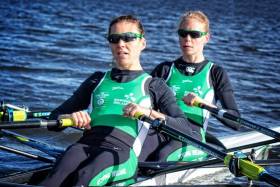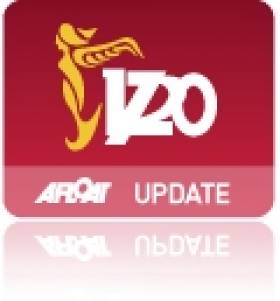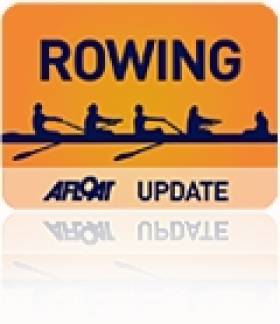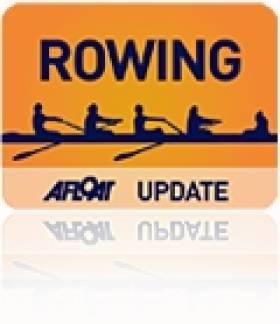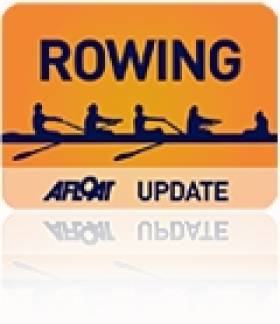Displaying items by tag: Walsh
Brilliant Gold Medal for O'Driscoll and O'Donovan at World Rowing
#Rowing: Ireland’s lightweight pair of Mark O’Donovan and Shane O’Driscoll took a brilliant gold medal at the World Rowing Championships in Sarasota-Bradenton in Florida. They got a tough challenge from Italy and Brazil, but O’Donovan and O’Driscoll produced a stunning row, with a stroke rate of well into the 40s right through the race. They took over the lead at 750 metres and never gave it up, despite concerted challenges by, first, Brazil and then Italy, who took second, with the South Americans taking bronze.
Walsh and Casey Win on London Olympic Course
#Rowing: Denise Walsh followed up her excellent silver medal at the European Championships in the Czech Republic with a win on the Olympic course at Dorney Lake in England today. Walsh partnered Aoife Casey, who has just turned 18, to a win in the Championship Double at Metropolitan Regatta. The Skibbereen double rowed well in the top event for women’s doubles at this big event, covering the course in seven minutes 13.27 seconds.
Brave Walsh Sculls Home After Being Rescued From Capsize
#Rowing: Denise Walsh capsized with 300 metres to go in her repechage of the World Cup in Poznan. The Skibbereen woman was well in contention for an A/B semi-final place, lying third going into the last quarter. But she stopped and then, not long after resuming, her boat flipped over almost competely. Rescue craft rushed to her and took minutes to take her out of the water. The Skibbereen woman was out of the race, but not out of determination: she climbed back in the boat. Though she was not listed as finishing, she sculled to the end.
World Cup Regatta, Poznan, Poland (Irish interest; selected results)
Men
Lightweight Pair - Heat Two (First to A Final; rest to Repechage): 1 Britain (J Cassells, S Scrimgeour) 6:44.66; 4 Ireland (M O'Donovan, S O'Driscoll) 6:48.29.
Lightweight Double Sculls - Heats (Winner to A Final; rest to Repechages) - Heat One: 1 France 6:19.48; 3 Britain (W Fletcher, R Chambers) 6:25.13. Heat Two: 1 Norway 6:18.90; 2 Ireland (G O'Donovan, P O'Donovan) 6:19.45, 3 Austria 6:34.23.
Women
Lightweight Double Sculls - Heats (Winner to A Final; rest to Repechages) - Heat One: 1 Netherlands 7:04.01. Heat Two: 1 Ireland (C Lambe, S Lynch) 7:05.36; 2 Poland 7:06.48, 3 Netherlands Two 7:09.28.
Lightweight Single Sculls - Heat Two (First Two to A/B Semi-Finals; rest to Repechages): 1 Denmark (A Runge Holmegaard) 7:55.99, 2 Netherlands Three (A Van Zomeren) 7:56.83; 3 Ireland (D Walsh) 8:11.09. Repechage (First Two to A/B Semi-Final; Three to Five to C Final): Walsh 11:32.83 (orginally listed as DNF)
#Rowing: Ireland had two fourth-place finishes in their first two A Finals of the European Rowing Championships in Brandenburg in Germany. The lightweight men’s pair of Mark O’Donovan and Shane O’Driscoll finished impressively to push Germany into fifth. Britain’s Sam Scrimgeour and Joel Cassells won, with Denmark second and Spain third. Lightweight single sculler Denise Walsh also had a good final quarter. Her race was dominated by Anja Noske of Germany, with Denmark and the Netherlands taking silver and bronze. Sinéad Jennings and Claire Lambe finished third in the B Final of the women’s lightweight double sculls, ninth overall. Sweden beat Britain into second, with Ireland over two seconds further back.
European Rowing Championships, Brandenburg, Germany – Day Three (Irish interest; selected results):
Men
Lightweight Pair – A Final: 1 Britain (S Scrimgeour, J Cassells) 7:00.38, 2 Denmark 7:03.94, 3 Spain 7:05.32; 4 Ireland (M O’Donovan, S O’Driscoll) 7:09.67
Women
Lightweight Double Sculls – B Final (Places 7 to 12): 1 Sweden 7:27.70, 2 Britain 7:27.99, 3 Ireland (C Lambe, S Jennings) 7:30.28.
Lightweight Single Sculls – A Final: 1 Germany (A Noske) 8:26.75, 2 Denmark 8:32.54, 3 Netherlands 8:37.05; 4 Ireland (D Walsh) 8:42.93.
Jennings and Lambe Win C Final at World Cup in Varese
#Rowing: Sinéad Jennings and Claire Lambe ended their campaign at the World Cup Regatta in Varese with a commanding performance to win the C Final of the lightweight double sculls. They led all the way and were four lengths clear of nearest rivals, Italy Three, at the finish.
Ireland had two competitors in the repechage of the women’s lightweight single sculls. There were two places on offer in an A Final, but Poland and Switzerland One took these. Siobhán McCrohan finished fifth and Denise Walsh sixth. In the lightweight men’s four, Ireland battled it out for third in the C Final with Austria, losing out by .15 of a second. In the C Final of the women’s pair, Leonora Kennedy and Barbara O’Brien finished third. Norway pipped Ukraine to win.
World Cup Regatta, Varese – Day Two (Selected Results, Irish interest)
Men
Lightweight Four – C Final (places 13 to 16): 1 Canada One 6:09.73, 2 Serbia 6:11.21, 3 Austria 6:15.85, 4 Ireland (L Seaman, M O’Donovan, L Keane, S O’Driscoll) 6:16.00.
Women
Pair – C Final (places 13 to 16): 1 Norway One 7:22.74, 2 Ukraine 7:23.16, 3 Ireland (L Kennedy, B O’Brien) 7:33.07.
Lightweight Double Sculls – C Final (places 13 to 17): 1 Ireland (C Lambe, S Jennings) 7:17.24, 2 Italy Three 7:26.29, 3 Chile 7:29.71.
Lightweight Single Sculls – Repechage (First Two to A Final; rest to B Final): 1 Poland Two 7:49.90, 2 Switzerland One 7:51.76; 5 Ireland Two (S McCrohan) 8:04.69, 6 Ireland One (D Walsh) 8:08.81
#Rowing: Ireland ended the first session of the World Cup in Varese with two heat wins and five crews set for the second chance of the repechages. Siobhan McCrohan finished fourth in her heat of the lightweight single sculls and Denise Walsh one place further back in her heat.
The men’s lightweight four finished fourth in their heat. The race was won by Italy Two, with the United States One second. Ireland placed fourth down the course, ahead of fifth-placed Austria One.
World Cup Regatta, Varese (Selected Results, Irish interest)
Men
Lightweight Four – Heat Three (First Two to A/B Semi-Final; rest to Repechages): 1 Italy Two 6:00.40, 2 United States 6:00.95; 4 Ireland (L Seaman, M O’Donovan, L Keane, S O’Driscoll) 6:18.75
Lightweight Double Sculls – Heat Three (First Two to A/B Semi-Final; rest to Repechages): 1 Ireland (P O’Donovan, G O’Donovan) 6:27.07, 2 Britain 6:33.38; 3 Netherlands Two 6:48.24.
Women
Pair – Heat One (First Two to A/B Semi-Final; rest to Repechages): 1 Germany 7:23.08, 2 Russia One 7:24.46; 5 Ireland (L Kennedy, B O’Brien) 7:46.38.
Lightweight Double Sculls – Heat Two (First Two to A/B Semi-Final; rest to Repechages): 1 Switzerland 7:03.98, 2 Canada 7:04.45; 3 Ireland (C Lambe, S Jennings) 7:05.0.
Single Sculls – Heat One (Winner to A/B Semi-Finals; rest to Repechages): 1 Ireland (S Puspure) 7:34.32; 2 Czech Republic (M Knapkova) 7:36.13.
Lightweight Single Sculls – Heat One (First Two to A/B Semi-Final; rest to Repechages): 1 Netherlands Two 7:40.25, 2 Italy 7:45.99; 4 Ireland Two (S McCrohan) 8:02.38.
Heat Two (First Two to A/B Semi-Final; rest to Repechages): 1 Canada 7:42.41, 2 Netherlands One 7:45.30; 5 Ireland One (D Walsh) 8:11.91.
Ireland Double Win D Final and Walsh Takes Second in C Final in Aiguebelette
#Rowing: Ireland’s women’s double and lightweight single sculler Denise Walsh finished their campaigns at the World Rowing Championships in Aiguebelette in France with good performances. Walsh took second in her C Final, 14th overall. She sprinted to the line and almost caught winner, Kate Johnstone of South Africa. Helen Hannigan and Lisa Dilleen won their D final, pushing Italy into second. The Ireland crew places 19th overall.
World Rowing Championships, Aiguebelette, France – Day Six (Irish interest)
Men
Lightweight Four – Semi-Final Two (First Three to A Final): 4
Britain (2 P Chambers) 6:58.68.
Lightweight Pair – A Final: 1 Britain (J Cassells, S Scrimgeour) 6:29.40. B Final (Places 7 to 12): 1 Ireland (M O’Donovan, S O’Driscoll) 6:46.44, 2 Spain 6:46.59, 3 Czech Republic 6:47.54.
Single Sculls – Semi-Final Two: 5 Britain (A Campbell) 6:51.24.
Women
Four – A Final: 1 United States 6:25.22, 2 Britain 6:31.52, 3 China 6:35.56; 5 Ireland (A Keogh, M Dukarska, L Kennedy, B O’Brien) 6:43.49.
Double Sculls – D Final (Places 19 to 24): 1 Ireland (H Hannigan, L Dilleen) 7:17.04, 2 Italy 7:18.38, 3 Ukraine 7:21.82.
Single Sculls – Semi-Final (First Three to A Final; rest to B Final): 1 China 7:24.41, 2 Czech Republic 7:26.48, 3 United States 7:27.39; 5 Ireland (S Puspure) 7:33.94.
Lightweight Single Sculls – C Final (Places 13 to 18): 1 South Africa 8:07.16, 2 Ireland (D Walsh) 8:07.96.
O'Driscoll and O'Donovan Sixth in Lucerne A Final
#Rowing: Mark O’Donovan and Shane O’Driscoll finished sixth in the A Final of the men’s lightweight pair at the World Cup in Lucerne. Britain and Italy fought it out for gold, with Italy winning. Denmark took bronze. The Ireland crew were in sixth through the four quarters.
Denise Walsh finished 4th in her B Final, 10th overall in the lightweight single sculls.
World Cup Regatta, Lucerne – Day One (Irish interest; selected results)
Men
Lightweight Pair – Repechage (First Four to A Final): 4 Ireland (M O’Donovan, S O’Driscoll) 6:50.28. A Final: 1 Italy 6:54.52, 2 Britain 6:54.71, 3 Denmark 6:56.81; 6 Ireland 7:14.15.
Lightweight Double Sculls – C Final (Places 13 to 18): 2 Ireland (G O’Donovan, P O’Donovan) 6:23.91.
Women
Pair – C Final (Places 13 to 18): 5 Ireland (H Hannigan, L Dilleen) 7:29.47.
Double Sculls – A/B Semi-Final (First Three to A Final; rest to B Final): 1 Belarus 7:14.98, 2 Germany 7:17.52, 3 Greece 7:19.13; 5 Ireland (H Hannigan, L Dilleen) 7:26.75.
Lightweight Double – A/B Semi-Final (First Three to A Final; rest to B Final): 1 South Africa 7:35.26, 2 US 7:36.79, 3 Germany 7:39.14; 5 Ireland (C Lambe, S Jennings) 7:44.11
Single Sculls – A/B Semi-Final (First Three to A Final; rest to B Final): 1 Australia (K Crow) 7:55.81, 2 United States (G Stone) 8:00.20, 3 New Zealand (F Bourke) 8:03.10; 5 Ireland (S Puspure) 8:11.50.
Lightweight Single – Repechage One (Two to A Final; rest to B Final): 3 Ireland (D Walsh) 8:11.47. B Final (Places 7 to 12): 1 South Africa (K Johnstone) 8:34.06; 4 Ireland (Walsh) 8:39.41.
Ireland Lightweight Pair Make A Final
#Rowing: The new Ireland lightweight pair of Mark O’Donovan and Shane O’Driscoll will compete in the A Final at the World Cup regatta in Lucerne. The two Corkmen finished fourth in their repechage to take their place in the top six overall.
Denise Walsh would have had to finish in the top two of her repechage to take her place in the A Final of the lightweight single sculls. She missed out by one place, and will compete in the B Final.
World Cup Regatta, Lucerne – Day One (Irish interest; selected results)
Men
Lightweight Pair – Repechage (First Four to A Final): 4 Ireland (M O’Donovan, S O’Driscoll) 6:50.28.
Women
Lightweight Single – Repechage One (Two to A Final; rest to B Final): 3 Ireland (D Walsh) 8:11.47.
Fifth Place in European Final for O'Donovan Brothers
#Rowing: The Ireland lightweight double of Paul and Gary O’Donovan finished fifth in the A Final at the European Rowing Championships in Poznan, Poland, this morning. France set a new European best time with a classy win, while Britain (with Richard Chambers in the bow seat) took silver. Ireland were in sixth through the first three quarters of the race but passed Turkey in the final 500 metres.
In the women’s lightweight doubles, Ireland’s Claire Lambe and Denise Walsh finished sixth. They had held that position through the race. In a race won with a runaway performance by Britain’s Charlotte Taylor and Kat Copeland, Ireland were in touch with the rest of the field until the closing stages when they did not match the finishing speed of the other five crews.
Joel Cassells and Peter Chambers won the lightweight pair for Britain. Both had represented Ireland at underage level.
European Rowing Championships, Poznan, Day Two (Irish interest)
Men
Lightweight Pair – A Final: 1 Britain (J Cassells, P Chambers) 6:28.58.
Lightweight Double Sculls – A Final: 1 France (S Delayre, J Azou) 6:11.38, 2 Britain (R Chambers, W Fletcher) 6:14.33, 3 Norway 6:15.53; 5 Ireland 6:21.89.
Women
Pair, B Final (Places 7 to 12): 1 Czech Republic 7:16.56, 2 Spain 7:17.04, 3 Ireland (L Kennedy, M Dukarska) 7:20.37.
Lightweight Double Sculls – A Final: 1 Britain 7:00.71, 2 Germany 7:05.27, 3 Poland 7:05.36; 6 Ireland (C Lambe, D Walsh) 7:13.41.
Lightweight Single Sculls, B Final (Places 7 to 12): 1 Denmark (R Holmegaard) 7:40.62, 2 Ireland (S Jennings) 7:45.64, 3 Netherlands 7:49.94.



























